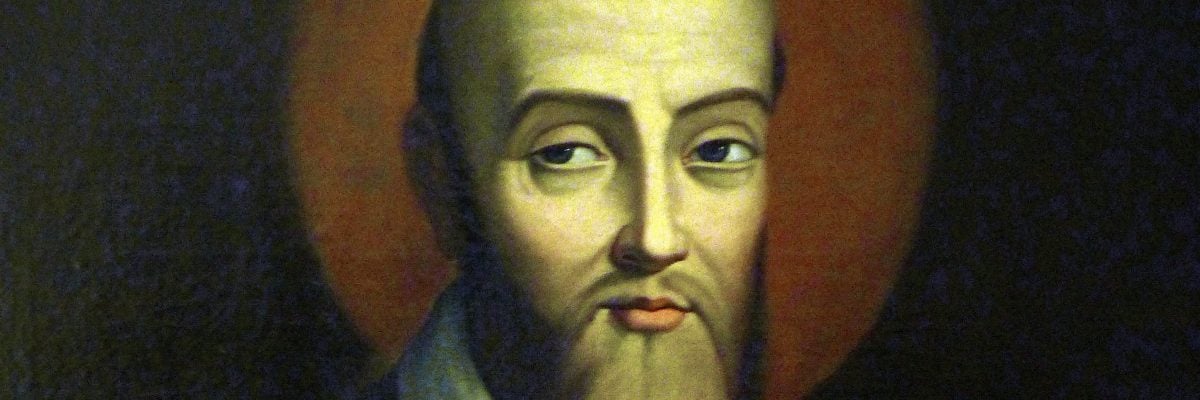
What might be the name of the firstborn son of a father named François and a mother named Françoise? The little baby was born in 1567 to educated and noble family in eastern France and would take the baptism name Francis Bonaventura, further solidifying his namesake.
That child became St. Francis de Sales, bishop of Geneva. Readers who know de Sales know that he was behind the conversion of tens of thousands of French and Austrian Calvinists, framing him in history as one of the most influential and effective Catholic apologists of all time.
As we all strive continually to reform ourselves and become better imitators of Christ and the saints, let me suggest three key lessons we can learn from this great saint.
Friendship for true conversion
Each time Francis entered into a debate, he first entered into a relationship with his opponent. His goal was not to win the argument for the glory of his personal achievements but to convert souls to Christ. Doing this sometimes caused these discussions of faith to span the course of years, and as the relationship grew through the writing of letters, occasional visits, and diplomatic envoys for goals they shared in common, Francis eventually won over his opponents with astonishing success. As the trust grew, the trust of information grew, and so followed the heart of those in serious search of Christ and his Church.
This is the approach he used in his meetings with the staunch and powerful Calvinist Duke of Lesdigueres. Francis and the duke met on a couple of occasions, and the two became regular correspondents. Over the course of years, while Francis continually showed his care for the health and welfare of the duke, the pithy arguments he provided stewed in the mind of the nobleman. Trust built, communication grew strong, and in due time the duke showed more interest in becoming Catholic. In this way, a simple but effective discipleship was formed, the duke made a full confession, and he and several of his men reconciled to the Catholic Church.
Concern for the soul
With his astonishing gifts in persuasion and understanding of theological topics, Francis must have published many treatises on the Catholic faith, right? The truth is, he published only a single book regarding doctrine and theological arguments. The rest of his works are a wonderful collection of Christian spiritual direction of which two are masterpieces: Treatise on the Love of God and one of the most popular Christian books of all time, Introduction to the Devout Life. These works are reflective of his primary motive as a bishop and priest—a shepherd of souls.
Before she was the co-founder of the Visitation Order with Francis de Sales, St. Jane Frances de Chantal was the widow of a baron who died in a hunting accident. For the next several years of her life, she didn’t know who she was, where she was headed, or what to do. But she remained vigilant of God’s work in her life, and she approached Francis for discipleship and direction. He could have given her a quick set of meetings and instructions in order to attend to the rest of his administrative and pastoral responsibilities, but he involved himself as much as she needed and as much as she requested. He did this for everyone who asked him for help, no matter the person, no matter the need. He famously said, “Ask for nothing, refuse nothing.”
Don’t reinvent the apologetic wheel
“For five years in Chablais,” he wrote, “I preached no books other than the Bible and the great Bellarmine.”
Although he was certainly educated in logic, literature, and disputations as a lawyer, Francis’s most effective tool for successfully convincing thousands of Protestants to return to the Faith was not coming up with novel arguments but using already effective arguments from other theologians and apologists of his time.
He used the texts of St. Robert Bellarmine because Bellarmine was widely known to be the best theologian of the sixteenth century, and his apologetic successes were demonstrated through his dealings with the Republic of Venice. He served as the top theological advisor to four popes, chaired the new school of controversial theology in Rome, and victoriously proved the logical holes in the emerging theology of James the First of England. The successes were plain to see, but the sheer volume of his work was also invaluable to bishops such as Francis. Bellarmine’s voluminous masterpiece, The Controversies, took every Protestant idea at the time, explaining and refuting each with such skill and articulation that no work of the time came close to matching it.
So Francis didn’t have to reinvent the apologetic wheel—he used what worked and spread it as widely as he could. That’s one reason why he’s the patron saint of the press and a powerful model and intercessor for all who are engaged in defending and explaining the Faith.
For more on Francis de Sales and other saints who will help you deepen your faith and practice daily conversion, check out Shaun’s book Reform Yourself! How to Pray, Find Peace, and Grow in Faith with the Saints of the Counter-Reformation, available now at Catholic Answers Press.



